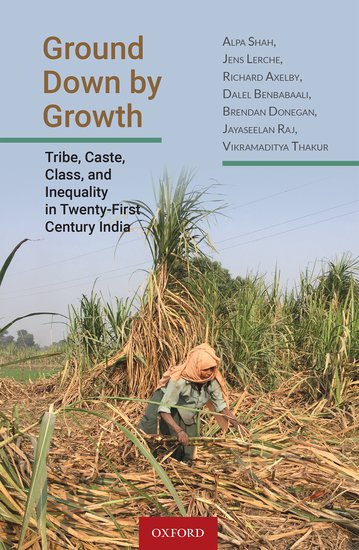The moment an adivasi in the remotest village plants tea or coffee, he is connected with the market in London. He has no choice. He is already living in the global economy. The issue is how to help him understand the global economy because if he cant understand the mainstream, he is going to be at a terrible loss in a few years time. If they are to survive and benefit from the present economic trends, it is essential that they first understand them.
B Ramdas, Co-founder and Managing Trustee
Viswa Bharati Vidyodaya Trust, Gudalur | Read the full interview here >>
Date Visited: Tue Jul 12 2011
[Bold typeface added above for emphasis]
Why has India’s astonishing economic growth not reached the people at the bottom of its social and economic hierarchy? Travelling the length and breadth of the subcontinent, this book shows how India’s ‘untouchables’ and ‘tribals’ fit into the global economy. […]
[This book] argues for an understanding of the lived reality of the poor, in particular, a more grass-roots approach to the processes of inequality and how they are experienced by particular groups [and] explores the trends that economists have presented by undertaking detailed ethnographic studies spread across strategically selected locations in five Indian states.
Source: Book description: Ground Down by Growth: Tribe, Caste, Class, and Inequality in Twenty-First Century India (Oxford University Press Indi)
URL: https://india.oup.com/product/ground-down-by-growth-9780199485062
Date visited: 24 July 2020
Read more about the Vidyodaya School for Adivasi children >>
Tip: to find books released by Indian publishers type the name of author in combination with “tribal” or “Adivasi” or include name of an Indian State, Union Territory or region (e.g. “Bastar”, “Northeast India”, “Nilgiri”).
Find scholarly books, poetry and fiction relating to tribal culture – Indian publishers
List of sites covered by this Google custom search engine
To find children’s and educational books or search Indian periodicals, magazines, web portals and other sources safely, click here >>
Search tips
Combine the name of any particular state, language or region with that of any tribal (Adivasi) community.
Add keywords of special interest (music, poetry, dance just as health, sacred grove and biodiversity); learn about the rights of Scheduled Tribes such as the “Forest Rights Act” (FRA); and the United Nations “Declaration on the Rights of Indigenous Peoples”, “Universal Declaration of Human Rights”, “women’s rights”, or “children’s right to education”.
Ask a question that includes “tribal” or “Adivasi”, for instance: “Adivasi way of life better?” (or “tribal way of life worse?”)
Specify any particular issue or news item (biodiversity, bonded labour and human trafficking, climate change, ecology, economic development, ethnobotany, ethnomedicine, global warming, hunter-gatherers in a particular region or state, prevention of rural poverty, water access).
For official figures include “scheduled tribe ST” along with a union state or region: e.g. “Chhattisgarh ST community”, “Himalayan tribe”, “Scheduled tribe Tamil Nadu census”, “ST Kerala census”, “Particularly Vulnerable Tribal Group Jharkhand”, “PVTG Rajasthan”, “Adivasi ST Kerala”, “Adibasi ST West Bengal” etc.
In case the Google Custom Search window is not displayed here try the following: (1) toggle between “Reader” and regular viewing; (2) in your browser’s Security settings select “Enable JavaScript” | More tips >>
Note: hyperlinks and quotes are meant for fact-checking and information purposes only | Disclaimer >>
Research the above issues with the help of Shodhganga: A reservoir of theses from universities all over India, made available under Open Access >>
